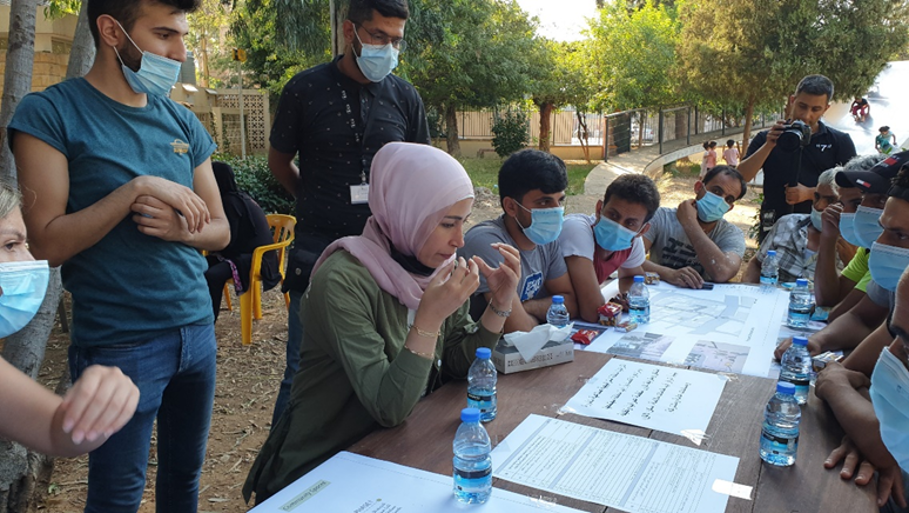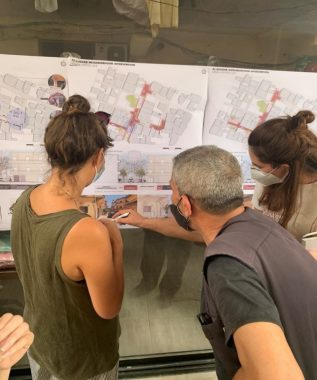The Beirut Urban Lab, American University of Beirut (Lebanon)
Second Place Prize Winner, 2023 MacJannet Prize
The Beirut Urban lab is a research space based in the American University of Beirut. It brings together a hybrid team of researchers and practitioners working to address issues of urban transformations in the context of conflict, inequality and recovery. The aim of the lab is to adopt a spatial lens and deploy innovative research methodologies to help imagine co-produced and multidisciplinary modalities of planning and designing towards sustainable, equitable and inclusive cities which can respond to environmental challenges, as well as support the aspirations of residents and shed light on the precarities of urban dwelling.

In a context where the Government of Lebanon selectively withdraws from public provision, the Lab, alongside a network of academics, activists and communities, seeks to understand and work with the variety of planning actors who operate at the policy level and/or intervene on the ground to inform governance processes. It also seeks to engage the wider public through an extensive set of openly accessible platforms with visualized data on multiple facets of the city and the built environment.
The Beirut Urban Lab has had a profound influence on the way in which students view the complex social and economic factors that shape and transform urban spaces. In addition to contributing to the intellectual life of AUB graduate students, the Lab provides students with hands-on experience in urban research and policymaking. Through workshops, fieldwork, and collaborations with local organizations, overseas universities and research networks, students learn how to analyze urban environments, identify opportunities for improvement, and develop design and planning responses that are viable and relevant to the needs of different communities. Students also work in interdisciplinary teams and get to present their ideas to a range of audiences. This practical experience is invaluable for students who are interested in pursuing careers in urban planning, design, policy and related fields, and who want to challenge existing injustices and shift towards a more equitable urban society.
By taking the urban realm as the focal point, the Lab has been able to work across disciplinary and sector-based divisions, to think with communities, local and national governments, and non-governmental groups, in order to learn about and inform the reshaping of the city.
“We are immensely grateful to receive the prestigious MacJannet Prize and to become part of the Talloires Network. Thank you for recognizing the efforts of our Lab in cultivating critical thinking, creativity, and passion. We’d also like to extend our thanks to the American University of Beirut, with its exceptional community, who have fostered a sense of belonging and exchange that allow us to pursue our mission. We are truly honored.”
 Today, the Lab is home to eight junior researchers, five senior researchers, and nine graduate students, who, are mostly graduate students at the Master programs of Planning, Policy and Design at the AUB Department of Architecture and Design, but also from other faculties in AUB, and from universities abroad. The Lab nurtures the personal academic interests and careers of each researcher, by providing them with a physical space, data management and analytical resources, as well as connections with a larger network of early-career and senior academics, activists and policymakers. These individuals, in turn, support students to engage with local communities in ways that are sustainable, inclusive and respectful of local values and cultures. Through this collaborative process, the Lab aims to transform how knowledge on urban studies and planning policy and practice is generated. The aim is to help imagine co-produced, multidisciplinary modalities of planning and designing towards sustainable, equitable and inclusive cities which can respond to environmental challenges, as well as support the aspirations of residents, especially those living precariously.
Today, the Lab is home to eight junior researchers, five senior researchers, and nine graduate students, who, are mostly graduate students at the Master programs of Planning, Policy and Design at the AUB Department of Architecture and Design, but also from other faculties in AUB, and from universities abroad. The Lab nurtures the personal academic interests and careers of each researcher, by providing them with a physical space, data management and analytical resources, as well as connections with a larger network of early-career and senior academics, activists and policymakers. These individuals, in turn, support students to engage with local communities in ways that are sustainable, inclusive and respectful of local values and cultures. Through this collaborative process, the Lab aims to transform how knowledge on urban studies and planning policy and practice is generated. The aim is to help imagine co-produced, multidisciplinary modalities of planning and designing towards sustainable, equitable and inclusive cities which can respond to environmental challenges, as well as support the aspirations of residents, especially those living precariously.
The Lab has developed four inter-related research tracks to holistically study urban conditions: the social value of land, planning actors and scales, urban recovery, and critical mapping. ‘The social value of land’ responds to the financialization of land and its impacts on residents’ ability to access housing and decent shared spaces. ‘Planning actors and scales’ addresses overlapping and inequitable power relations which shape the city, including urban responses to crises and disasters (e.g. the Syrian refugee crisis, the pandemic, the Beirut Port Blast). In a context where the Government of Lebanon selectively withdraws from public provision, the Lab, alongside activists and residents, seeks to understand and work with the variety of planning actors who operate at the policy level and/or intervene on the ground to inform governance processes. ‘Urban recovery’ addresses the issues of rupture to, and erasure of, the built fabric, as well as economic and social networks within the city, advocating for people-centered, integrated and environmentally-responsive urban strategic responses. ‘Critical mapping’ understands that visualizations and the map have been used as tools for imposing hegemonic, oppressive logics and land relations on dwellers, and seeks to invent new, more democratic ways, of mapping. Community members are deeply embedded in the Lab’s research design process, in order to empower dwellers to co-create meaningful data that is relevant to the specific challenges they face. Research projects use participatory methods including the Citizen Science methodology, in which community members are hired and trained to work as researchers. Citizen Scientists ensure that the research and planning activities undertaken by the Lab amplify the voices of members of the community who are not heard in planning processes. This is in addition to diverse modes of community engagement such as town hall meetings, focus groups, and co-design workshops.
The Lab also actively engages with the academic and planning communities of Beirut and the MENA region. The Lab has a strong presence in the public domain and is invited to comment on what is happening in Lebanon by local, regional and international media. Lab members are also regularly invited to speak in international academic and policy-making fora. In addition, the Lab works with a multiplicity of stakeholders who inform the work and utilize its research outputs, including professional groups and experts (e.g. the Order of Engineers and Architects (OEA)), private firms, civil society organisations, UN agencies and international organizations, all of whom represent diverse interests in the urban. By nurturing these professional, community and media partnerships, the Lab seeks to build an ecosystem of just and viable change, which can affect diverse and intersecting aspects of the urban realm.